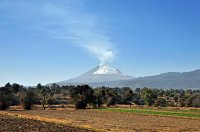Discover San Andres Cholula in Mexico
San Andres Cholula in the region of Puebla is a place located in Mexico - some 60 mi or ( 97 km ) South-East of Mexico City , the country's capital .
Local time in San Andres Cholula is now 03:34 PM (Tuesday) . The local timezone is named " America/Mexico City " with a UTC offset of -6 hours. Depending on your mobility, these larger cities might be interesting for you: San Miguel Xoxtla, San Andres Calpan, Puebla, Pachuca, and Ometoxtla. When in this area, you might want to check out San Miguel Xoxtla . We discovered some clip posted online . Scroll down to see the most favourite one or select the video collection in the navigation. Are you looking for some initial hints on what might be interesting in San Andres Cholula ? We have collected some references on our attractions page.
Videos
Turismo San Andres Cholula
..
cuetes_cholula.wmv
..
El pico del petròleo explicado
El comienzo de todos los problemas, escaces enèrgetica de òrigen fòsil, alimentos suben de precio o escaces de los mismos, medicinas, materias primas. Crisis econòmica. ..
Cholula trip 12/03/2010 - Sana convivencia en Cholulandia tierra prehispánica.
Una probada del último viaje de estudios hecho por la banda asechada por este canal en youtube, para que vean lo que se pierden los que no van a las reuniones (wero, prefe, mey, Iris (golosita), Ale, ..
Videos provided by Youtube are under the copyright of their owners.
Interesting facts about this location
Great Pyramid of Cholula
The Great Pyramid of Cholula, also known as Tlachihualtepetl (Nahuatl for "artificial mountain"), is a huge complex located in Cholula, Puebla, Mexico. It is the largest archaeological site of a pyramid (temple) in the New World. The pyramid stands 55 metres above the surrounding plain, and in its final form it measured 400 by 400 metres (by ft). The pyramid is a temple that has traditionally been viewed as having been dedicated to the god Quetzalcoatl.
Located at 19.06 -98.30 (Lat./Long.); Less than 1 km away
Cholula (Mesoamerican site)
Cholula, was an important city of pre-Columbian Mesoamerica, dating back to at least the 2nd century BCE, with settlement as a village going back at least some thousand years earlier. The great site of Cholula stands just west of the modern city of Puebla. Its immense pyramid exceeds the Pyramid of the Sun at Teotihuacan in volume. It is the largest pyramid structure in the Americas.
Located at 19.06 -98.31 (Lat./Long.); Less than 2 km away
Universidad de las Américas Puebla
Universidad de las Américas Puebla (commonly known as UDLAP, English: University of the Americas), is a private university in Mexico. It is located in San Andrés Cholula, Puebla, a suburb of Puebla. The university is known for its programs in Arts and Humanities, Social sciences, Science and Engineering, and Business and Economics.
Located at 19.05 -98.28 (Lat./Long.); Less than 2 km away
Tonantzintla Observatory
Tonantzintla Observatory is an astronomical observatory located in the municipality of San Andrés Cholula in the Mexican state of Puebla. It consists of two adjacent facilities: the National Astrophysical Observatory of Tonantzintla, operated by the National Institute of Astrophysics, Optics and Electronics (INAOE), and the National Astronomical Observatory - Tonantzintla, operated by the National Autonomous University of Mexico (UNAM).
Located at 19.03 -98.32 (Lat./Long.); Less than 3 km away
National Institute of Astrophysics, Optics and Electronics
The National Institute of Astrophysics, Optics and Electronics is a Mexican science research institute located in Tonantzintla, Puebla. Founded by presidential decree on 11 November 1971, it has over 100 researchers in astrophysics, optics, electronics and computing science, with postgraduate programs in these areas. INAOE is one of 30 public research centers sponsored by the National Council of Science and Technology of Mexico (CONACyT).
Located at 19.03 -98.32 (Lat./Long.); Less than 3 km away
Pictures
Related Locations
Information of geographic nature is based on public data provided by geonames.org, CIA world facts book, Unesco, DBpedia and wikipedia. Weather is based on NOAA GFS.




